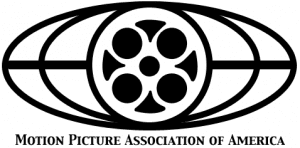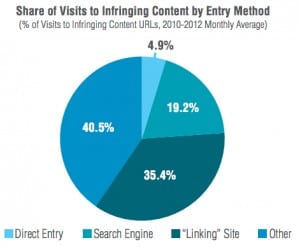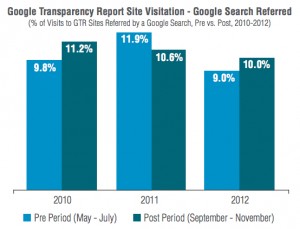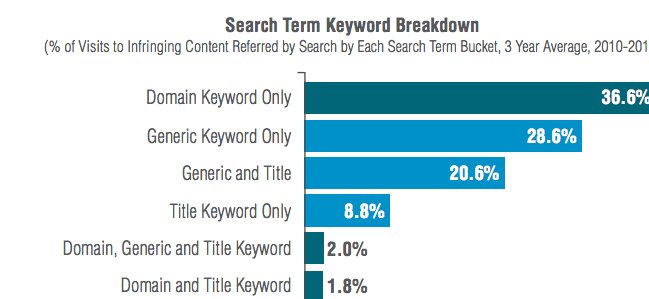Practical Lessons from the MPAA’s Search Engine Study
 In recent months, Google’s role in the piracy ecosystem has been hotly debated.
In recent months, Google’s role in the piracy ecosystem has been hotly debated.
Much of it started with Ellen Seilder’s Popup Pirates site (Note: She has since moved to Vox Indie) which attacked what she saw as Google’s role in supporting piracy-oriented sites though advertising.
This eventually led to Google (as well as other advertising networks) agreeing to a new DMCA-like protocol that would deal with pirate sites that were running legitimate advertisements.
More recently though, much of the focus has shifted to Google search and, more specifically, the prevalence of pirate sites in Google search results, even as legitimate offerings increase in number. In August 2012, Google promised to use what it was gleaning in its transparency report to penalize sites that received a large number of takedown notices, creating a so-called “Pirate Penalty”.
However, less than a year later, major copyright holders already displeased with the results. In February of this year, the Recording Industry Association of America (RIAA) posted to their blog questioning whether the penalty was effective, noting that pirate sites still ranked highly for many search terms, including terms that were not piracy-specific.
The growing criticism prompted Google, earlier this month, to release a new report entitled “How Google Fights Piracy”, which highlights many of the ways the search giant claims it fights copyright infringement.
However, those claims are being challenged, at least in part, by a study released by Motion Picture Association of America (MPAA) and performed by the research firm Compete (PDF), which examines the role of search engines in directing individuals to pirated content.
For copyright holders, it’s important to take a look at the study and analyze what its findings likely mean both in terms of Google’s role in driving people to pirate sites and what it means for copyright enforcement efforts.
The Basic Findings
 At first glance, the findings aren’t particularly interesting. Of the visits to infringing content, only 19.2% of all visits came from search engines. That number is further lessened by 42% of those visits were “Domain” terms, meaning that the person was searching for a known pirate site similar term.
At first glance, the findings aren’t particularly interesting. Of the visits to infringing content, only 19.2% of all visits came from search engines. That number is further lessened by 42% of those visits were “Domain” terms, meaning that the person was searching for a known pirate site similar term.
This means that approximately 11% (19.2% x 58%) of all of the visits to infringing content were from people who punched in “Generic” terms (such as titles of movies or songs and broad terms such as “watch movies online”) into a search engine. All in all, this represents a fairly small amount of the visits to infringing content.
However, the study also showed the importance of these viewers. They were significantly more likely to be first time viewers of infringing content and are the people most likely to become customers if they had landed on non-infringing sites.
 The study also looked at the impact that Google’s “Pirate Penalty” has had on sites hosting infringing material. There, it seemed to find that Google’s penalty has had little impact. Though there has been some drop in the percentage of traffic referred to infringing sites by Google, the study didn’t consider it statistically significant.
The study also looked at the impact that Google’s “Pirate Penalty” has had on sites hosting infringing material. There, it seemed to find that Google’s penalty has had little impact. Though there has been some drop in the percentage of traffic referred to infringing sites by Google, the study didn’t consider it statistically significant.
Furthermore, looking at the placement of sites featured in Google’s Transparent report found that there was almost no change in their actual ranking.
So what does this mean for someone seeking to protect their work from infringement? While the report doesn’t make any specific recommendations, there are a few takeaways that content creators should pay attention to.
Protecting Your Work
Though the report stops short of making recommendations as to how creators should try to protect their works, there are a few lesson that can be quickly gleaned.
- Google DMCAs Still Matter: Though Google, percentage-wise, is not significant for discovering pirate content, it serves an audience, primarily first-time searchers, that are among the most likely to become legitimate customers. When direct removal is not possible, a removal from Google can still help, even if the impact on overall piracy is limited.
- Google’s Penalty Doesn’t Matter: Though long suspected and other reports have found the same, Google’s “Pirate Penalty” has done little to hurt pirate sites. As such, blasting a site with multiple DMCA notices in hopes of harming its overall ranking is, most likely, pointless.
- Attacking the Source When Possible: Though there are times going after search engines and other location tools can be useful, as the study shows, the ways infringers locate illegal material is varied, making that a difficult approach. When possible, removing the infringing work directly is usually the best approach.
- SEO is Important: Search engine optimization (SEO) is going to be a bigger and bigger issues for legitimate services. Not only do they have to compete with large numbers of illegal sites, most of which have many inbound links, but it’s clear the search engine penalties are not going to solve the problem alone. One of the best solutions may be to beat the pirate sites at their own game.
While none of these lessons are particularly new, especially to long-time readers of this site, the study seems to reiterate these points nicely and provide evidence to show why they are the case.
Bottom Line
Regarding the study’s allegation that Google is an “important resource” for people to find pirated material, this definitely appears to be the case for first time viewers.
Experienced pirates and those who are most active in seeking out illegal material have little need for a search engine. Their favorite sites are already well known and bookmarked. However, they are also the least likely to become paying customers, having long been set in their ways.
It’s the first time viewer that is the most likely to become a legitimate customer and the ones most likely to be using a search engine according to this study. That makes it important for the search engines to ensure that users who want to seek out legitimate material are driven to it.
No one benefits when a likely consumer or a neutral user (one with no clear intent to pirate) is directed to infringing material.
That, in turn, is the challenge for both content creators and search engines alike, how to best keep the illegal sites out of the top results. There are no easy answers, but at least with some good data, we can know where things sit.
Want to Reuse or Republish this Content?
If you want to feature this article in your site, classroom or elsewhere, just let us know! We usually grant permission within 24 hours.
